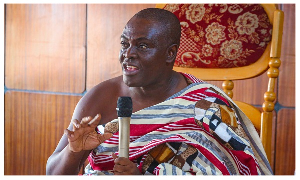Business News of Monday, 25 June 2012
Source: GNA
Fear of major risks by international investors mostly unfounded- Study
A new study by Roland Berger Strategy Consultants (RBSC) has urged private international investors to overcome their fear of major risks and get more involved in major infrastructure projects in emerging nations.
"We urgently need international investors to be more involved in major infrastructure projects to ensure growth and prosperity for many countries; Businesses should overcome their fear of major risks which is totally unfounded in some cases” stated Mr Charles –Edouard Bouée, Partner and member of the global management of RBSC.
This was revealed in a statement containing highlights of the study, released on Monday by RBSC’s communications team; Lionsun Consulting in Accra on Monday.
The study said about 145 emerging nations with low to moderate gross national incomes need $ 851 billion for infrastructure annually, in order to secure further growth. However, most private international investors fear the risks involved in major infrastructure projects.
It said these countries, where most of the growth of the past few years took place need $851 billion each year to cover electricity, water supply, transportation and telecom infrastructure in particular, in order to keep growing; the lack of which meant they were producing 45 per cent less than they could.
Africa alone lost around USD 9 billion in 2011 as a result and private investors need to assess the risks involved more realistically to profit more from these countries' growth.
Mr. Bouée said, "private international investors have a duty to help modernize essential infrastructure in the emerging nations in Asia, Africa and Latin America, not only can they help emerging nations grow, but they can also open up important areas of business in new markets for themselves because only growth generates more growth"
Between 2005 and 2010, Europe's gross domestic product (GDP) grew only 0.8% annually. By contrast, GDP in Asia grew by more than 5% annually over that same period. Africa, Middle East and Latin America saw annual growth of around 4%. The greatest demand comes from the 35 countries with low gross national incomes (USD 1,005 per capita or less) and the 110 with moderate gross national incomes (up to USD 12,275 per capita). They lack a total investment of USD 851 billion in essential infrastructure projects: to supply electricity (USD 317 billion), water supplies and drains (USD 199 billion), transportation (USD 163 billion), telecommunications (USD 81 billion) and irrigation (USD 38 billion).
"Countries with gaps in their infrastructure will come up against their limits to growth sooner or later", is how Roland Berger Partner Hakim El Karoui sees the situation. "If the necessary conditions like good power supplies or an efficient transportation and telecoms network are not in place, the local economy can't grow”
In West Africa, huge investments are expected in countries like Ghana or Nigeria which is forecasts to be the world's fastest growing construction market of this decade, averaging a 9.4% annual growth rate between 2009 and 2020 – well ahead even of China's 8% or India's 9.2%.
The study noted that major projects called for large amounts of start-up capital, and what really worried private investors is the long-term planning involved, as market conditions often change over a project's life.
It recommended some relatively simple tools that could help private investors invest safely in infrastructure projects including traditional risk management methods such as using insurance and other guarantees, involving local partners and financial institutions to help businesses counteract political and currency risks and using specific-purpose bonds to help fund such products.
"The public-private partnership model is the best way for emerging nations to ensure essential investment in their infrastructure in future," El Karoui stated adding that "Spreading the investment among more people could benefit the local population, local business and investors themselves."
Roland Berger Strategy Consultants, founded in 1967, is one of the world's leading strategy consultancies. With 2,500 employees working in 49 offices in 35 countries worldwide, we have successful operations in all major international markets. The strategy consultancy is an independent partnership exclusively owned by over 220 Partners.**










